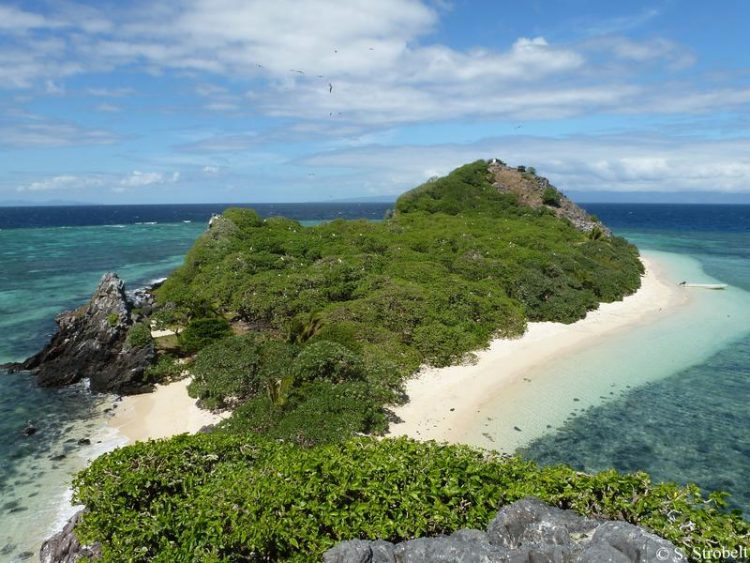Cluster of Excellence CliSAP Introduces Online Island Database for Climate Researchers

Threatened habitat: dwellers of small islands live in fear of the rising sea level. UHH/CEN/Simon Strobelt
This observation is substantiated by a new online data collection, established by geographers of Universität Hamburg’s Center for Earth System Research and Sustainability (CEN). Available immediately, the Integrated Island Database (IIDAB) combines geographic, economic and socio-scientific data—an unprecedented approach, enabling researchers to conduct comprehensive and comparative investigations of islands and their specific climate risks.
The innovative resource originated at CliSAP, the Cluster of Excellence “Integrated Climate System Analysis and Prediction.” It is a component of the research focus on regional variations in sea level rise and its ramifications for coastal and island societies.
“On small islands, the repercussions of global warming are as evident as under a burning glass,” says database initiator Prof. Beate Ratter. “The effect on often economically vulnerable island societies is more immediate than on developed large-area countries, such as Germany, Canada or Russia.” Therefore, islands are a key area of interdisciplinary climate research. Despite its tremendous force, Hurricane Katrina, for instance, destroyed less than two percent of the United States’ gross national product in 2005. The island Grenada by contrast, lost two hundred percent of its GNP to Tropical Storm Ivan, a year prior to Katrina.
Another example: If the South West Pacific acidifies due to an overdose of released CO2, the coral reefs surrounding low-lying islands, such as Tuvalu or Kiribati, will die. At the same time, their protective function as natural breakwaters will be lost as well. Against the backdrop of more frequent extreme weather events, for example, heavy storms, storm tides or floods, this poses a great threat. A simultaneous sea level rise would turn the inhabitants of Tuvalu into climate refugees. Their island is situated less than two metres above sea level, on average.
The database provides easy access and caters precise information about islands. It is thus a useful tool for climate and island researchers working on case studies. “Its use of twenty combined search criteria produces plenty of information on natural and social sciences within seconds. Previously, scientists depended on time-consuming research methods,” explains Beate Ratter. The island database offers physio-geographical indices as to expanse, island type, distance to the mainland (Isolation Index), and highest elevation.
In addition, it encompasses societal information, for instance, details on population and residential density, political status, GNP, or economic factors, which are at least equally important. Also included are the crucial Sea Level Rise Index and the so-called Climate Risk Index, which specifies how natural disasters affect individual countries. It is established by the environmental organization Germanwatch under consideration of the factors death toll and insurance expenditures owing to extreme weather events. The remaining data was derived from international organizations, such as the United Nations (UN), the World Bank, the CIA, the US National Oceanic and Atmospheric Administration (NOAA), and individual case studies.
Currently, about eighty islands and island nations are represented in the database, including all fifty-seven so-called Small Island Developing States (SIDS). Within the framework of the UN, this group of states continuously calls attention to its precarious situation. Mostly located in Oceania or in the Caribbean, these microstates are disadvantaged and sensitive in economic respect. According to the Integrated Island Database, the SIDS are home to around sixty-seven million inhabitants.
Universität Hamburg’s Cluster of Excellence “Integrated Climate System Analysis and Prediction” (CliSAP) and all partner institutions receive funding from the German Research Foundation (DFG). CliSAP is the seedbed of the Center for Earth System Research and Sustainability (CEN). The CEN comprises nine institutes and facilities at Universität Hamburg, merging expertise from natural and social sciences.
Further information:
Integrated Island Database (IIDAB)
www.island-database.uni-hamburg.de
Cluster of Excellence “Integrated Climate System Analysis and Prediction” (CliSAP)
www.clisap.de
UN Conference on Small Island Developing States
http://www.sids2014.org
Photos
Photos are available upon request in printer quality. Online display at: http://www.island-database.uni-hamburg.de/about.php
Please, send your request to: caroline.kieke@uni-hamburg.de
In case of inquiries, please contact:
Prof. Dr. Beate M. W. Ratter
Institut für Geographie
Centrum für Erdsystemforschung und Nachhaltigkeit der Universität Hamburg
Tel: +49 40 42838-5225
Email: ratter@geowiss.uni-hamburg.de
Media Contact
All latest news from the category: Earth Sciences
Earth Sciences (also referred to as Geosciences), which deals with basic issues surrounding our planet, plays a vital role in the area of energy and raw materials supply.
Earth Sciences comprises subjects such as geology, geography, geological informatics, paleontology, mineralogy, petrography, crystallography, geophysics, geodesy, glaciology, cartography, photogrammetry, meteorology and seismology, early-warning systems, earthquake research and polar research.
Newest articles

Largest magnetic anisotropy of a molecule measured at BESSY II
At the Berlin synchrotron radiation source BESSY II, the largest magnetic anisotropy of a single molecule ever measured experimentally has been determined. The larger this anisotropy is, the better a…

Breaking boundaries: Researchers isolate quantum coherence in classical light systems
LSU quantum researchers uncover hidden quantum behaviors within classical light, which could make quantum technologies robust. Understanding the boundary between classical and quantum physics has long been a central question…

MRI-first strategy for prostate cancer detection proves to be safe
Active monitoring is a sufficiently safe option when prostate MRI findings are negative. There are several strategies for the early detection of prostate cancer. The first step is often a…



